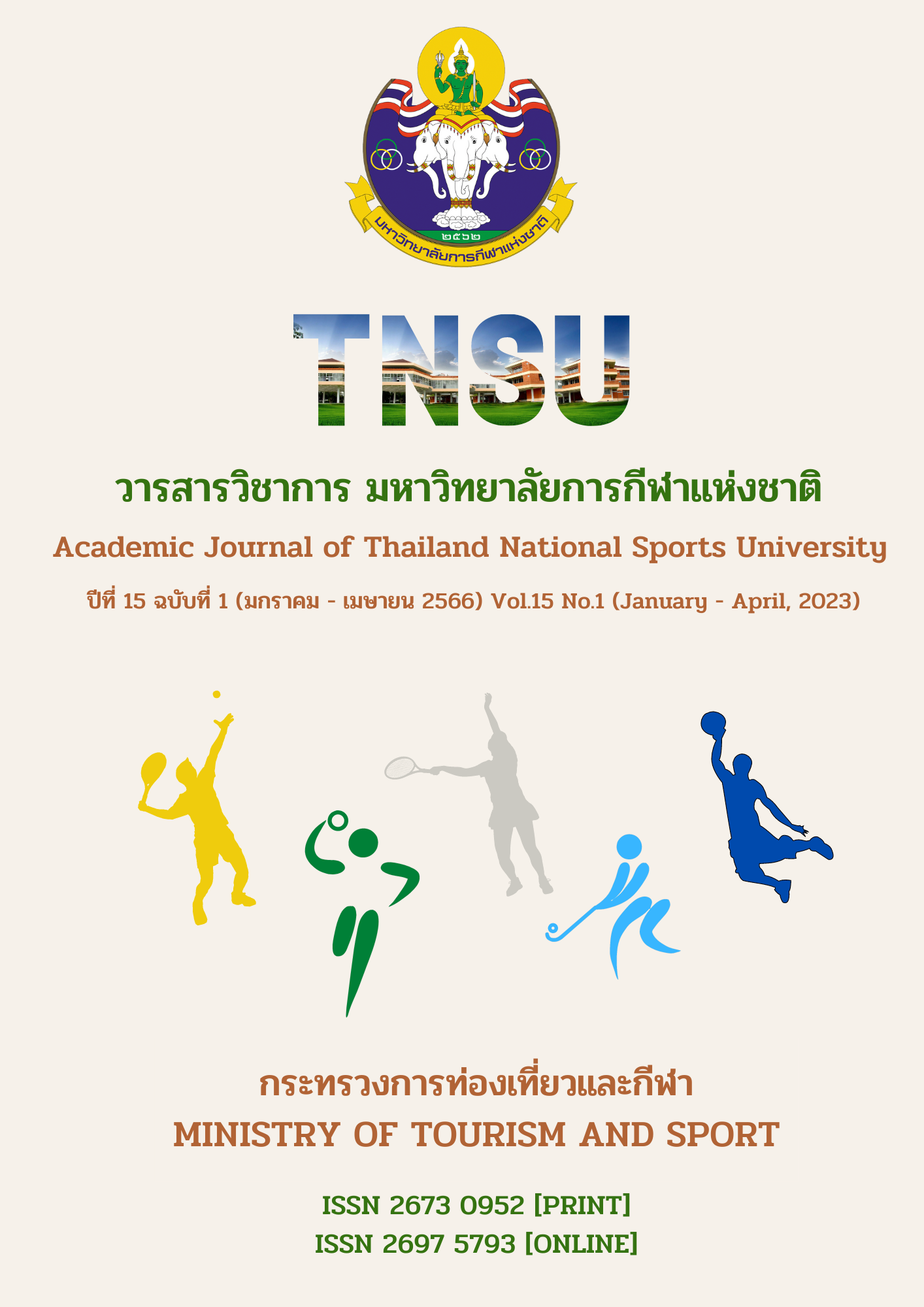THE PLANNING MANAGEMENT PROCESS OF SPORT CENTER IN THAILAND UNIVERSITY
Main Article Content
Abstract
This research aims to study the management planning process of sports centers in Thailand Universities. This was qualitative research by in - depth interviews with key informants serving as sports center administrators in Public Universities, Autonomous universities, and Private Universities. The Popular reputable and established for at least 10 years, amount 6 universities. The sample group used a specific sampling method (Purposive Sampling), such as the director, deputy director, and administrative staff of the Sports Center. The research instrument was a semi - structured in - depth interview form the researcher has created a framework based on the concept of management theory and the function of management (Function of Management) of Lewis Allen (1973, as cited in Stuart Crainer, 2008, pp. 32 - 33) in the aspect of planning for the management of sports centers in the university. There are 7 sub-elements, namely forecasting, setting objectives. scheduling work schedule budgeting defining the workflow and setting goals. The results of the research revealed that the planning management of sports centers in public universities short - term operations are planned to comply with centralized policies. Situations are assessed and analyzed to formulate strategic plans and objectives in line with the university's policies, national sports development plan and educational development plans at the higher education level. Planning for the management of sports centers in autonomous universities. There is a plan for both short-term and long - term operations by setting working standards are following the regulations of each university. The sports center's policies are planned, resulting in a good working process that can effectively and efficiently achieve the goals of the sports center. And planning for the management of sports centers in private universities. There is a plan for both short - term and long - term operations. Forecasting the future of an organization can only be made to a certain extent because private universities have to wait to assess the situation that affects the management. Planning must therefore be flexible following the policy and opinions of the administrators, and factors that increase or decrease the number of students that will affect the budget allocation and support for providing services to the target groups of the sports center.
Article Details

This work is licensed under a Creative Commons Attribution-NonCommercial-NoDerivatives 4.0 International License.
The published article is a copyright of the Academic Journal of Thailand National Sports University. The passage appeared in each article in this academic journal is a perspective of each author which is not related to the journal. Each author is required to be responsible for all components of his/her own article. If there are any mistakes, each author must be responsible for those mistakes on his/her own.
References
Ampha Sujinno. (2002). Management of sports centers in public universities (Master’s thesis), Mahidol University.
Chalip, L. (2006). Toward a distinctive sports discipline. Journal of Sport Management, 20, 1 - 21.
Chelladurai, P. (2005). Managing Organizations for Sport and Physical Activity: A Systems Perspective (2nd ed.). Scottsdale, AZ: Holcomp Hathaway.
Costa, C. A. (2005). The status and future of sport management: A Delphi study. Journal of Sport Management, 19, 117 - 142.
Filip, A. (2011). Relationship marketing applicability in business to business market. Romanian Journal of Marketing, 2, 30 - 37.
Gulick, L., & Urwick, L. (1937). Paper on the Science of Administration. New York: Institute of Public Administration.
Jackie, K., & Emma, S. (2012). Community benefits of major sport facilities: The Darebin International Sports Centre. Sport Management Review, 15(2), 218 - 229.
Kotler, P. (2000). Marketing Management. New Jersey: Prentice - Hall.
Ministry of Tourism and Sports. (2017). National Tourism Development Plan, Vol. 2 (2017 - 2021). Bangkok: Office of Printing Works of the War Veterans Organization.
Natchanit Thanathampanon. (2013). Guidelines for solving problems of sports center management for institutional excellence. (Master’s thesis), Burapha University.
Nikorn Seelae. (2012). Strategies for developing sports towards excellence in the Institute of Physical Education: Developing Criteria and Assessed using programming theory (Doctoral dissertation), Burapha University.
Peerasak Wilairat. (2012). Strategic Management. Retrieved from http://www.pantown.com/ group.php?Display=conent&id=36749&name=content368 area=3
Phavida Tarasrisutthi, & Wiboon Towanabutr. (1999). Principles and theories of educational administration. Bangkok: Publishing House Ramkhamhaeng University.
Stuart Crainer. (2551). Key management Ideas: Combining the best of modern management concepts. Bangkok: SE-ED Book Center.
Wachira Sukcharoen. (2011). The study of the management of the Muak Lek National Sports Training Center (Master’s thesis), Chulalongkorn University.
Wichit Srisa - an. (2015). Autonomous University: Innovation. University administration in Thailand. Academic documents.
Wikipedia. (n.d.). Public autonomous university. Retrieved from https://th.wikipedia.org/wiki/สถาบันอุดมศึกษาในกำกับของรัฐ
Witsanu Phuphan. (2010). Management competence of designers of automotive lamp parts: A case study. Thai Stanley Public Company Limited (Master’s thesis), Rajamangala University of Technology Thanyaburi.


